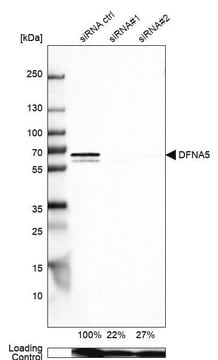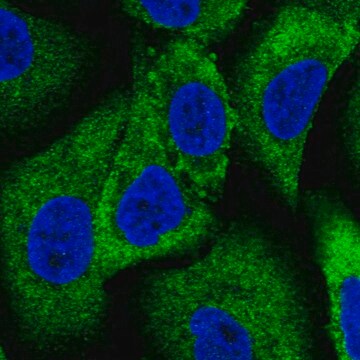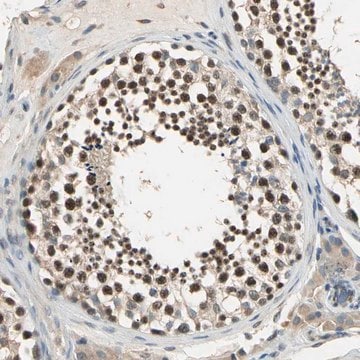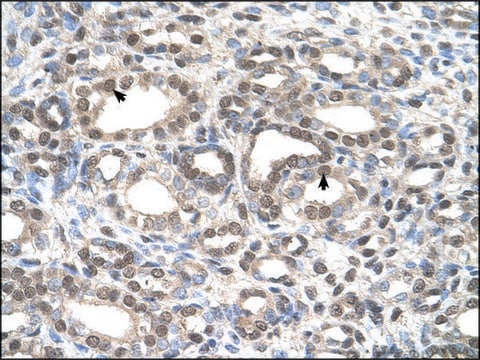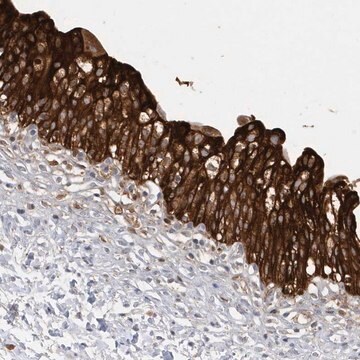推荐产品
生物源
rabbit
共軛
unconjugated
抗體表格
affinity isolated antibody
抗體產品種類
primary antibodies
無性繁殖
polyclonal
產品線
Prestige Antibodies® Powered by Atlas Antibodies
形狀
buffered aqueous glycerol solution
物種活性
human
加強驗證
orthogonal RNAseq
Learn more about Antibody Enhanced Validation
技術
immunoblotting: 0.04-0.4 μg/mL
immunohistochemistry: 1:200-1:500
免疫原序列
GVFEKFPKLKVCFAHGGGAFPFTVGRISHGFSMRPDLCAQDNPMNPKKYLGSFYTDALVHDPLSLKLLTDVIGKDKVILGTDYPFPLGELEPGKLIESMEEFDEETKNKLKAGNAL
UniProt登錄號
運輸包裝
wet ice
儲存溫度
−20°C
目標翻譯後修改
unmodified
基因資訊
human ... ACMSD(130013)
一般說明
ACMSD (aminocarboxymuconate semialdehyde decarboxylase) is an enzyme involved in the kynurenine pathway. This enzyme resides in the cytoplasm, and is expressed at significant but very low levels in brain. This enzyme is a zinc-dependent amidohydrolase. This protein is composed of 336 amino acids and has a molecular weight of 40kDa.
免疫原
2-amino-3-carboxymuconate-6-semialdehyde decarboxylase recombinant protein epitope signature tag (PrEST)
應用
All Prestige Antibodies Powered by Atlas Antibodies are developed and validated by the Human Protein Atlas (HPA) project and as a result, are supported by the most extensive characterization in the industry.
The Human Protein Atlas project can be subdivided into three efforts: Human Tissue Atlas, Cancer Atlas, and Human Cell Atlas. The antibodies that have been generated in support of the Tissue and Cancer Atlas projects have been tested by immunohistochemistry against hundreds of normal and disease tissues and through the recent efforts of the Human Cell Atlas project, many have been characterized by immunofluorescence to map the human proteome not only at the tissue level but now at the subcellular level. These images and the collection of this vast data set can be viewed on the Human Protein Atlas (HPA) site by clicking on the Image Gallery link. We also provide Prestige Antibodies® protocols and other useful information.
The Human Protein Atlas project can be subdivided into three efforts: Human Tissue Atlas, Cancer Atlas, and Human Cell Atlas. The antibodies that have been generated in support of the Tissue and Cancer Atlas projects have been tested by immunohistochemistry against hundreds of normal and disease tissues and through the recent efforts of the Human Cell Atlas project, many have been characterized by immunofluorescence to map the human proteome not only at the tissue level but now at the subcellular level. These images and the collection of this vast data set can be viewed on the Human Protein Atlas (HPA) site by clicking on the Image Gallery link. We also provide Prestige Antibodies® protocols and other useful information.
生化/生理作用
ACMSD (aminocarboxymuconate semialdehyde decarboxylase) regulates the levels of quinolinate for de novo nicotinamide adenine dinucleotide biosynthesis, and thus, decides the fate of tryptophan metabolites in the kynurenine pathway. Mutation in this protein is linked with the development of familial cortical myoclonic tremor and epilepsy (FCMTE), which is an autosomal dominant disorder. This gene is linked with with cortical myoclonus, epilepsy, and parkinsonism. It is responsible for homeostasis of picolinic acid (PA), quinolinic acid (QA) and NAD. The expression of this protein is elevated in diabetes and by adrenaline, glucocorticoid and female hormones.
特點和優勢
Prestige Antibodies® are highly characterized and extensively validated antibodies with the added benefit of all available characterization data for each target being accessible via the Human Protein Atlas portal linked just below the product name at the top of this page. The uniqueness and low cross-reactivity of the Prestige Antibodies® to other proteins are due to a thorough selection of antigen regions, affinity purification, and stringent selection. Prestige antigen controls are available for every corresponding Prestige Antibody and can be found in the linkage section.
Every Prestige Antibody is tested in the following ways:
Every Prestige Antibody is tested in the following ways:
- IHC tissue array of 44 normal human tissues and 20 of the most common cancer type tissues.
- Protein array of 364 human recombinant protein fragments.
聯結
Corresponding Antigen APREST72113
外觀
Solution in phosphate-buffered saline, pH 7.2, containing 40% glycerol and 0.02% sodium azide
法律資訊
Prestige Antibodies is a registered trademark of Merck KGaA, Darmstadt, Germany
免責聲明
Unless otherwise stated in our catalog or other company documentation accompanying the product(s), our products are intended for research use only and are not to be used for any other purpose, which includes but is not limited to, unauthorized commercial uses, in vitro diagnostic uses, ex vivo or in vivo therapeutic uses or any type of consumption or application to humans or animals.
Not finding the right product?
Try our 产品选型工具.
儲存類別代碼
10 - Combustible liquids
水污染物質分類(WGK)
WGK 1
閃點(°F)
Not applicable
閃點(°C)
Not applicable
個人防護裝備
Eyeshields, Gloves, multi-purpose combination respirator cartridge (US)
Lu Huo et al.
Proteins, 83(1), 178-187 (2014-11-14)
Human α-amino-β-carboxymuconate-ε-semialdehyde decarboxylase determines the fate of tryptophan metabolites in the kynurenine pathway by controlling the quinolinate levels for de novo nicotinamide adenine dinucleotide biosynthesis. The unstable nature of its substrate has made gaining insight into its reaction mechanism difficult.
Silvia Garavaglia et al.
The FEBS journal, 276(22), 6615-6623 (2009-10-22)
The enzyme alpha-amino-beta-carboxymuconate-epsilon-semialdehyde decarboxylase (ACMSD) is a zinc-dependent amidohydrolase that participates in picolinic acid (PA), quinolinic acid (QA) and NAD homeostasis. Indeed, the enzyme stands at a branch point of the tryptophan to NAD pathway, and determines the final fate
Jose Felix Martí-Massó et al.
Journal of molecular medicine (Berlin, Germany), 91(12), 1399-1406 (2013-08-21)
Familial cortical myoclonic tremor and epilepsy is a phenotypically and genetically heterogeneous autosomal dominant disorder characterized by the presence of cortical myoclonic tremor and epilepsy that is often accompanied by additional neurological features. Despite the numerous familial studies performed and
Shin-Ichi Fukuoka et al.
The Journal of biological chemistry, 277(38), 35162-35167 (2002-07-26)
Quinolinate (quinolinic acid) is a potent endogenous excitotoxin of neuronal cells. Elevation of quinolinate levels in the brain has been implicated in the pathogenesis of various neurodegenerative disorders, the so-called "quinolinate hypothesis." Quinolinate is non-enzymatically derived from alpha-amino-beta-carboxymuconate-epsilon-semialdehyde (ACMS). Alpha-amino-beta-carboxymuconate-epsilon-semialdehyde
我们的科学家团队拥有各种研究领域经验,包括生命科学、材料科学、化学合成、色谱、分析及许多其他领域.
联系技术服务部门
